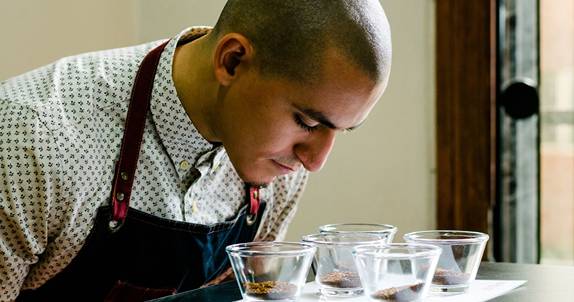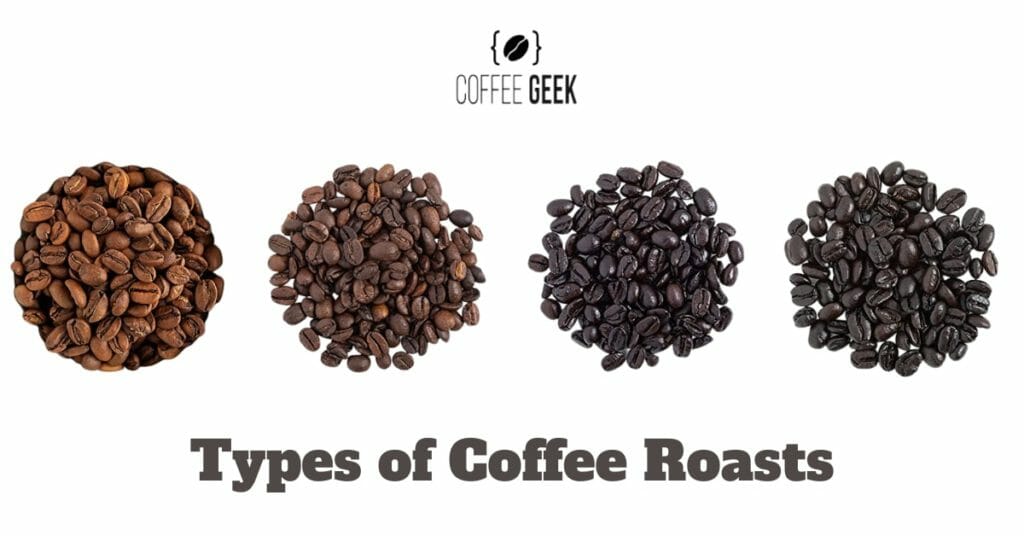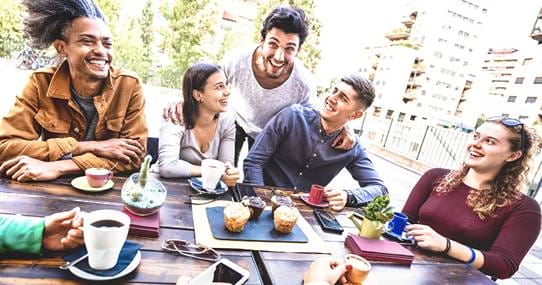Coffee, known as the king of beverages, holds a significant place in people’s lives across the world. One of the primary reasons people love coffee is the energizing boost they experience due to its caffeine content.
Unsurprisingly, a significant fraction of coffee drinkers consume this aromatic beverage to kickstart their mornings or power through hectic workdays with the energy boost it provides.

Another factor that draws people to coffee is its unique taste and aroma.
Why do people like coffee?
Each cup of coffee has a complex blend of flavors and enticing scents that entice the taste buds and offer a comforting sensation.
Moreover, the cultural and psychological aspects of coffee also play a role in its popularity, as friends and colleagues often gather around a cup of joe to exchange ideas, create connections or simply unwind.
It’s also interesting to not that some people like to drink black coffee over coffee with milk. How do you think you would prefer you coffee?
Key Takeaways
Coffee offers an energizing boost due to its caffeine content, making it a favored choice for kickstarting the day.
The unique taste and aroma of coffee create a comforting experience that many people enjoy.
Coffee serves as a social unifier, bringing people together for conversations, relaxation, and networking.
The Science of Coffee and Caffeine – Why Do People Like Coffee?
Caffeine and Its Effects
Caffeine, a natural stimulant found in coffee beans, is the main reason behind the energizing effects of drinking coffee.
It is a psychoactive substance that acts upon the central nervous system, promoting alertness and reducing fatigue.

When consumed, caffeine blocks the action of adenosine, a neurotransmitter responsible for inducing sleep and relaxation.
As a result, individuals who consume caffeine often experience an energy boost and increased focus.
Coffee’s Impact on Long-Term Memory
There is evidence to suggest that moderate coffee consumption can enhance long-term memory.
Researchers have found that caffeine can consolidate memory and improve recall, particularly when it comes to information learned during periods of stress.
It appears to have a positive impact on the brain, people drink coffee providing potential health benefits beyond keeping us awake and alert.

The Link Between Genes and Coffee Consumption
Studies have uncovered a connection between genetics and an individual’s coffee preferences.
Some people are naturally more sensitive to the bitter taste of coffee due to differences in their taste receptors.
However, regular coffee drinkers might develop a tolerance to bitterness, contributing to their enjoyment of the beverage.
This suggests that our love of coffee is not solely based on its caffeine content, but can also be influenced by our genetic makeup.
Caffeine as a Psychostimulant
Caffeine is a well-known psychostimulant, providing a temporary boost in cognitive functions such as attention, concentration, and problem-solving abilities.
Its stimulating effects on the brain can become habit-forming, and some individuals may develop a mild addiction to coffee and its caffeine content.
Frequent consumption of caffeinated beverages can lead to tolerance, which requires higher doses to achieve the same effects.

This could potentially result in withdrawal symptoms, such as irritability and headaches, when trying to cut back or eliminate caffeine from the diet.
In moderation, coffee consumption has been associated with numerous health benefits, such as improved focus and enhanced long-term memory. However, excessive intake can lead to dependence and withdrawal symptoms.
The enjoyment of coffee and its effects on the body vary from person to person, influenced by factors such as genetics and individual sensitivity to caffeine.
The Taste and Aroma of Coffee
Coffee enthusiasts appreciate the beverage for its complex flavors, distinct aroma, and the many variations that can be enjoyed.

In this section, we will discuss the factors that influence coffee’s taste and aroma, including bitterness, roasting techniques, and coffee quality.
Understanding Coffee’s Bitterness
Coffee’s bitterness is primarily due to the presence of compounds such as chlorogenic acid and quinine.
Bitterness is a characteristic taste that some individuals are particularly sensitive to, but it can be balanced with coffee’s inherent sweetness.
The balance of bitterness and sweetness in a cup of coffee can be influenced by factors such as the type of coffee beans, brewing methods, and personal taste preferences.
Coffee Roasts and Their Flavors

The flavor of coffee is greatly influenced by the roasting process.
Generally, coffee roasts can be classified into three categories: light, medium, and dark.
Light Roast: These beans are roasted for a shorter time, preserving the distinct flavors of their origin. Light roast coffee typically has a higher acidity, more pronounced floral and fruity notes, and a subtle sweetness.
Medium Roast: Medium roast coffee is roasted longer, resulting in more balanced flavors. The taste profile generally includes caramel, nutty, and chocolatey notes, with a moderate level of acidity and bitter taste.
Dark Roast: Dark roast coffee is roasted the longest, which imparts a bold, intense flavor and a lower acidity. The roasted flavor dominates, with smoky and bitter notes being more prominent.
Coffee Quality and Its Influence on Taste
The quality of coffee beans plays a crucial role in determining the taste and aroma of the final brew.
High-quality coffee beans tend to have more complex and nuanced flavors, while lower-quality beans may produce a less enjoyable cup.
Factors that influence coffee quality include the cultivation region, bean variety, and post-harvest processing methods.
In conclusion, the taste and aroma of coffee encompass a wide range of flavors and sensations, contributing to its enduring appeal.
By understanding the factors that influence coffee’s taste and aroma, coffee lovers can appreciate the beverage on a deeper level and make more informed choices when selecting beans or preparing their next cup.
Coffee and Health
Potential Health Benefits of Drinking Coffee
Drinking coffee has been linked to many health benefits. For example, moderate coffee consumption (2-5 cups a day) can lower the likelihood of developing type 2 diabetes, heart disease, liver and endometrial cancers, Parkinson’s disease, and depression.
Coffee contains antioxidants that help fight free radicals in the body, protecting cells from damage.
Furthermore, caffeine can boost energy levels by fighting fatigue and increasing alertness, making it a popular choice for many people.
Learn how you can like coffee too here.
Possible Risks of Coffee and Caffeine Addiction
Despite the health benefits of coffee, excessive consumption can lead to caffeine addiction.
High caffeine content in coffee can cause physical addiction, leading to withdrawal symptoms like headaches, fatigue, and irritability when people try to stop or reduce their intake.
It’s essential to be mindful of one’s coffee consumption and be aware of the potential downsides.
Coffee Consumption and Kidney Stones

Research on the association between coffee consumption and kidney stones has shown mixed results.
Some studies have found that coffee may help reduce the risk of kidney stones, while others have shown a potential link between high coffee intake and an increased risk.
It’s essential to consider other factors, such as genetics and lifestyle, when evaluating this potential connection.
Coffee’s Effect on Liver Health
Coffee may play a promising role in liver health, particularly in reducing the risk of cirrhosis.
People who drink coffee have been found to be less likely to develop liver diseases, and cirrhosis of the liver. It is also suggested that coffee may lower the risk of liver cancer.
Coffee Consumption and Breast Cancer Risk
The relationship between coffee consumption and breast cancer risk is complex and not yet fully understood.
Some studies have shown a potential protective effect, while others have indicated no significant correlation or even a slight increase in risk.
More research is needed to develop a clear understanding of the connection between coffee intake and breast cancer risk.
Cultural and Psychological Aspects of Coffee
Coffee’s Role in Social Settings
Coffee has played a significant role in various social settings throughout history.
It has often been a popular beverage choice for fostering conversations and interaction, acting as a social drink, people drink coffee, which facilitates communication and bonding.
Coffee shops have become commonplace environments for people to relax, catch up with friends, engage in work or study, and even have business meetings.
Coffee’s widespread availability and its role as a comforting beverage have contributed to its continued popularity in various cultures.

Coffee as a Comforting Ritual
For many individuals, drinking coffee is more than just a way to stay alert; it can also be a ritualistic and comforting habit.
The process of brewing, pouring, and sipping a warm cup of coffee can offer a sense of relaxation and familiarity that is often associated with starting the day off right or taking a break from a busy schedule.
This comforting ritual can be found across various cultures, with each having their own unique touch, such as enjoying an espresso shot in Italy or having a Turkish coffee in the Middle East.
The psychological dependence on these rituals can offer a sense of stability and order amidst the chaos of everyday life.
The Image and Lifestyle Associated With Coffee
Coffee has become more than just a beverage; it is now part of a lifestyle accompanied by a certain image.
The act of drinking coffee has been associated with being a “morning person,” alluding to being alert, active, and ready to tackle the day.

This image has been further amplified by marketing campaigns and social media, showcasing that people drink coffee as an essential element of one’s daily routine.
The lifestyle associated with coffee consumption is linked to various themes such as productivity, style and sophistication, making it appealing, especially to young professionals and creatives.
In essence, coffee has transcended its role as a mere beverage and has become a cultural symbol intertwined with modern living.
| Reasons Why People Like Coffee | Description |
|---|---|
| 1. Caffeine Boost | Many people enjoy coffee for its stimulating effect, helping them stay alert and focused. |
| 2. Aroma and Taste | Coffee is appreciated for its rich, diverse flavors and aromatic qualities, catering to various palates. |
| 3. Social Connection | Coffee often serves as a social beverage, bringing people together for conversations and meetings. |
| 4. Morning Ritual | For some, coffee is an essential part of their daily morning routine, helping kickstart the day. |
| 5. Comfort and Warmth | Coffee offers a sense of comfort and warmth, especially during cold weather. |
| 6. Productivity | Many find that coffee enhances their productivity and helps them stay focused on tasks. |
| 7. Versatility | Coffee can be prepared in numerous ways (e.g., espresso, cappuccino, cold brew), providing options for different preferences. |
| 8. Exploration and Variety | The world of coffee offers an array of options, encouraging exploration and discovery of new flavors. |
| 9. Antioxidant Benefits | Some people appreciate coffee’s potential health benefits due to its high antioxidant content. |
| 10. Ritual and Relaxation | The act of making and savoring coffee can be a calming ritual for some individuals. |
Understanding the Coffee Shops Industry
Popular Coffee Beans and Their Origins
Millions of people drink coffee worldwide, and for good reason.
There’s a wide variety of coffee beans available that originate from different regions and exhibit unique flavors and characteristics:
Arabica: These beans are the most popular globally, accounting for about 60% of coffee production. Arabica beans are known for their smooth, balanced taste and are typically grown in higher altitudes in countries like Brazil, Colombia, and Ethiopia.
Robusta: Often used in espresso blends, Robusta beans are more bitter substances and contain more caffeine than Arabica. They’re typically grown in lower altitudes in regions such as Vietnam, Africa, and Indonesia.
These two primary beans are grown in various regions across Central and South America, Africa, and Asia, each contributing to the diverse flavors and profiles loved by coffee drinkers.
The Craft of Brewing Coffee
A significant part of the coffee industry is the focus on the craft of brewing. This includes selecting the perfect beans, roasts, and brewing method to create the ideal cup of coffee.
There are several popular brewing methods that highlight different aspects of the beans:
Drip coffee: The most common brewing method, using gravity to filter hot water through ground coffee in a paper or metal filter. This results in a bright and clean taste, capturing the coffee’s acidity.
Espresso: Produced by forcing pressurized hot water through finely ground coffee, resulting in a concentrated and bold flavor. Espresso is commonly used as a base for other beverages like lattes and cappuccinos.
French press: This method uses a plunger to press coffee grounds and water together, creating a rich and full-bodied taste.
The French press allows more oils and flavors from the beans to be extracted, providing a bolder, more unique drink coffee experience.
Coffee roasters play a crucial role in the industry, providing consumers with fresh and expertly roasted beans to suit their individual preferences.
From light roasts that highlight fruity and floral notes, to dark roasts with bold and smoky flavors, there’s a seemingly endless variety of coffee roasts to choose from.
In today’s coffee world, skilled baristas and coffee growers continue to experiment with new methods and blends to satisfy the ever-evolving coffee tastes and demands of the global coffee-loving community.
Coffee – Not Just a Bitter Beverage
Coffee, a beloved beverage for many people around the world, is more than just a bitter-tasting drink. Despite its bitter taste, coffee drinker, and enthusiasts are drawn to various aspects of this popular beverage.
To begin with, coffee is well-known for its energizing effects. When people drink coffee, they often experience an increase energy levels and focus, primarily attributed to caffeine’s stimulating properties.
This makes it a popular choice for people during work or study, helping them stay awake and alert throughout the day.
Another reason why coffee is well-liked is its rich aroma and flavor.
Brewing coffee releases complex and enticing aromas that appeal to the senses, making the entire coffee-drinking experience a sensory delight.
Moreover, coffee comes in various forms, such as espresso, cappuccino, and latte, offering a unique taste and experience for every palate.
Additionally, the social aspect of coffee drinking plays a significant role in its popularity.
Many coffee shops and cafes are not just places to grab a quick hot cup of coffee; they have evolved into social hubs where friends meet up, people work or study, and conversations flourish.
The warm and inviting atmosphere of these establishments encourages camaraderie and relaxation, making coffee an integral part of social interactions.
Lastly, coffee is both an art and a science. The process of brewing a perfect cups of coffee is an intricate combination of variables, including grind size, water temperature, and extraction time.
Many people enjoy experimenting with different brewing methods, such as pour-over, French press, and cold brew, to explore the diverse flavor profiles that can be achieved.
In conclusion, coffee is much more than just a bitter taste beverage. It offers an energizing boost, a sensory experience, and a social connection for its avid drinkers.
From the delightful aromas to the various brewing methods, it’s no wonder why people around the globe are fascinated with this versatile and beloved drink.
Frequently Asked Questions
What makes coffee so enjoyable?
Coffee is often enjoyed for its taste and aroma, as well as the energizing boost it provides from the caffeine content.
In addition to that, it is also a warm and comforting beverage that can be customized to individual preferences, making it an appealing choice for many people.
How does coffee affect our mood?
Coffee can have a positive impact on our mood as it contains caffeine, which is a stimulant.
The caffeine in coffee is known to increase alertness and improve cognitive function, more coffee can help people feel more focused and energized.
This in turn can lead to a more positive outlook and overall mood in some people.
What role does socializing play in coffee consumption?
Socializing has a significant role in coffee consumption. Coffee shops and cafes create a relaxed environment where people can meet and talk.
This makes coffee the perfect companion for conversations, networking, and bonding with friends or loved ones.
Additionally, it brings people together, whether it’s a casual meet-up or a work-related discussion, enabling them to connect over a shared love for this beverage.
Why is coffee a popular choice for a morning routine?
Coffee is a popular choice for a morning routine because it offers a quick and easy way to get an energizing boost.
Many people appreciate the stimulation that caffeine works, which helps them start their day with focus and energy.
Additionally, the ritual of preparing and enjoying a cup of coffee drink can be soothing and comforting, helping people transition into their daily tasks.
What are the factors that influence people’s preference for coffee?
People’s preference to drink coffee can be influenced by various factors, including individual taste preferences, exposure to different coffee cultures, and personal experiences.
The availability of an array of coffee flavors, brew methods, and variations also plays a part in helping people find their ideal cup of joe.
How does culture impact the love for coffee?
Culture plays an important role in shaping people’s love to drink coffee.
Different regions and countries have their unique ways of preparing and consuming coffee, which can range from dark and strong espresso shots in Italy to the sweet, milky coffee found in countries such as Vietnam.
As people become more exposed to various coffee cultures, their appreciation and love for the beverage often grows.
This leads to a greater variety of coffee experiences and an expansion of the global coffee-loving community.

